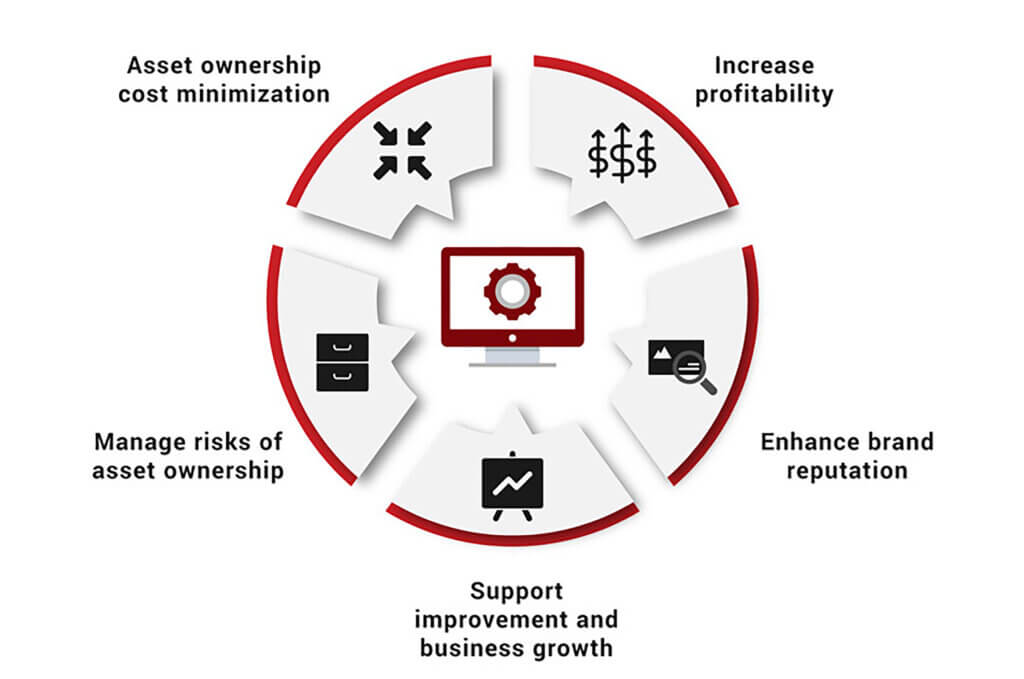What is ISO 55001?
ISO 55001 is an asset management system standard, the main objective of which is to help organizations manage the lifecycle of assets more effectively. By implementing ISO 55001 organizations will have better control over daily activities, achieve higher return with their assets, and reduce the total cost of risk. This standard can be applied to all organizational structures of companies, and to all types of assets. The concrete outcomes consist of a growth in effectiveness accompanied by a dramatic drop in unit cost. This framework also supports continual improvement of performance and offers improvements for an organization of any industry, type or size.
Why Asset Management is important for you?
ISO 55001 will guide you toward significant asset management improvements by enabling you to meet the stakeholder, business and legal requirements. It is the company’s most potent defense for saving money and time. By managing the assets properly, you will be able to use your available assets wisely and get more out of their utilization while delivering added value to the business. It is designed to support you in the proper handling of processes and risks, which will lead to the improvement of current and future company performance. Moreover, the implementation of an Asset Management System that complies with ISO 55001 enables the organization to align its objectives with asset management system objectives which leads the organization towards achieving its intended outcomes. Moreover, ISO 55001 aligns the organization’s objectives with asset management objectives since the purpose of asset management is achieving organizational objectives.
What Is ISO 55001 Certification?
Being ISO 55001 certified means that you are capable of helping your organization in developing an active approach to lifecycle asset management. With ISO 55001 certification you demonstrate your skills in being able to support your organizational growth by:
Benefits of ISO 55001 Asset Management
PECB ISO 50001 Certified individuals will have the opportunity to gain many benefits, but not limited to:

PECB Certified ISO 55001 Training courses available
Learn more about Asset Management through the PECB ISO 55001 training courses. Contact us today to learn how this standard can lead you towards successful project implementation with regard to asset management. Check below to find the training that suits you best.
ISO 55001 Introduction
- Understand the concepts, approaches, methods, and techniques used to implement an Asset Management System
- Understand the basic elements of an Asset Management System (AMS)
ISO 55001 Lead Implementer
- Learn how to support an organization to effectively plan, implement, manage, monitor and maintain an AMS
- Acknowledge the correlation between ISO 55001 and other standards and regulatory frameworks
- Learn how to interpret the ISO 55001 requirements in the specific context of an organization
- Master the concepts, approaches, standards, methods and techniques for the implementation and effective management of an AMS
- Acquire the expertise to advise an organization in implementing Asset Management System best practices
ISO 55001 Foundation
- Understand the elements and operations of an Asset Management System and its principal processes
- Acknowledge the correlation between ISO 55001 and other standards and regulatory frameworks
- Understand the approaches, methods and techniques used for the implementation and management of an AMS
ISO 55001 Lead Auditor
- Understand the operation of an Asset Management System based on ISO 55001 and its principal processes
- Understand the goal, content and correlation between ISO 55001, ISO 55002 and other standards and regulatory frameworks
- Understand an auditor’s role in planning, leading and following-up on a management system audit in accordance with ISO 19011
- Interpret the requirements of ISO 55001 in the context of an AMS audit
- Acquire the competencies to plan an audit, lead an audit, draft reports, and follow up on an audit in compliance with ISO 19011
- Strengthen personal skills necessary for an auditor to act with due professional care during an audit

